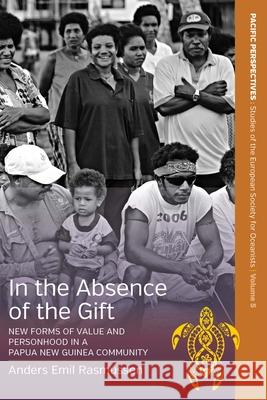In the Absence of the Gift: New Forms of Value and Personhood in a Papua New Guinea Community » książka
In the Absence of the Gift: New Forms of Value and Personhood in a Papua New Guinea Community
ISBN-13: 9781782387817 / Angielski / Twarda / 2015 / 210 str.
In the Absence of the Gift: New Forms of Value and Personhood in a Papua New Guinea Community
ISBN-13: 9781782387817 / Angielski / Twarda / 2015 / 210 str.
(netto: 483,13 VAT: 5%)
Najniższa cena z 30 dni: 498,70
ok. 30 dni roboczych.
Darmowa dostawa!
." . . a very convincing case for the refiguring of our understanding of contemporary remittance motivations. Crucial to this is the focus on sharing, as opposed to formal transaction . . . Also original and exciting is the emphasis on the deployment of 'community' as a crucial indigenous category of description and organization . . . I have not read a better or more convincing account of the category in Melanesia." - Adam Reed, University of St. Andrews " This book] significantly advances arguments in the discipline in a number of key areas, such as the relationship between community and individualism, the role of money, and the nature of obligation in exchange. It marks a significant contribution to our ethnographic understanding of the relationship between gifts and community building." - Keir Martin, University of Manchester By adopting ideas like "development," members of a Papua New Guinean community find themselves continuously negotiating what can be expected of a relative or a community member. Nearly half the people born on the remote Mbuke Islands become teachers, businessmen, or bureaucrats in urban centers, while those who stay at home ask migrant relatives "What about me?" This detailed ethnography sheds light on remittance motivations and documents how terms like "community" can be useful in places otherwise permeated by kinship. As the state withdraws, Mbuke people explore what social ends might be reached through involvement with the cash economy. Anders Emil Rasmussen is curator and researcher at the Vejle Museums (Denmark). His publications include Materialities of Passing (co-ed., Ashgate, in preparation).
". . . a very convincing case for the refiguring of our understanding of contemporary remittance motivations. Crucial to this is the focus on sharing, as opposed to formal transaction . . . Also original and exciting is the emphasis on the deployment of community as a crucial indigenous category of description and organization . . . I have not read a better or more convincing account of the category in Melanesia." · Adam Reed, University of St. Andrews"[This book] significantly advances arguments in the discipline in a number of key areas, such as the relationship between community and individualism, the role of money, and the nature of obligation in exchange. It marks a significant contribution to our ethnographic understanding of the relationship between gifts and community building." · Keir Martin, University of ManchesterBy adopting ideas like "development," members of a Papua New Guinean community find themselves continuously negotiating what can be expected of a relative or a community member. Nearly half the people born on the remote Mbuke Islands become teachers, businessmen, or bureaucrats in urban centers, while those who stay at home ask migrant relatives "What about me?" This detailed ethnography sheds light on remittance motivations and documents how terms like "community" can be useful in places otherwise permeated by kinship. As the state withdraws, Mbuke people explore what social ends might be reached through involvement with the cash economy.Anders Emil Rasmussen is curator and researcher at the Vejle Museums (Denmark). His publications include Materialities of Passing (co-ed., Ashgate, in preparation).











